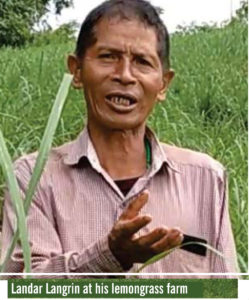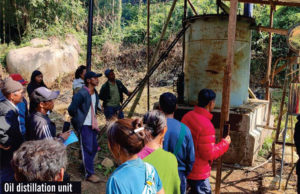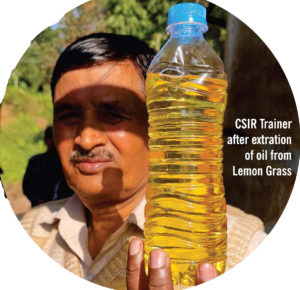In an eternal quest for greener and ecological alternatives to the traditional mining and tilling, Landar Langrin presents a case of generating aromatic oils with modest means. Dialoguing with Langrin, Sunday Shillong unearths a classic story of an able man finding his calling with aromatic oils, emerging as one of the progressive farmers under the Mawshynrut Block in West Khasi Hills District through sheer hard work and ingenuity. On World Environment Day, deviating from the traditional idea of oils extracted from fossil fuels we bring to our readers another category of aromatic ones, extracted from a huge wasteland of West Khasi Hills, now made fragrant.
The journey
 Prior to becoming one of the successful farmers in the District, Langrin was a well known traditional medicine practitioner of Mawshynrut area, practicing and serving the people with his traditional medicine. His stint with the aroma world dates back to May, 2017 when Langrin partook in an exposure visit to CSIR – Central Institute of Medicinal and Aromatic Plants (CSIR-CIMAP), Lucknow for a duration of 6 days. The excursion was on the “Cultivation and primary processing of economically important medicinal and aromatic plants” organised by the office of Basin Development Unit (BDU), West Khasi Hills District.
Prior to becoming one of the successful farmers in the District, Langrin was a well known traditional medicine practitioner of Mawshynrut area, practicing and serving the people with his traditional medicine. His stint with the aroma world dates back to May, 2017 when Langrin partook in an exposure visit to CSIR – Central Institute of Medicinal and Aromatic Plants (CSIR-CIMAP), Lucknow for a duration of 6 days. The excursion was on the “Cultivation and primary processing of economically important medicinal and aromatic plants” organised by the office of Basin Development Unit (BDU), West Khasi Hills District.
Upon his return, an enthused Langrin resolved to make headways into a project of his own based on his years of expertise. He also found this opportunity to grow medicinal plants such as lemongrass and citronella to be exotic and profitable in the long run, and so he took it up as a challenge to begin with the plantation in his area.
Supported by the office of Basin Development Unit which is in turn sponsored and provided by the CSIR-CIMAP, Lucknow, on the 9th October, 2019 Langrin received 40000 seedlings of lemongrass and citronella. Out of 40000 seedings, 15000 numbers of seedlings were provided to 15 farmers of his village in which each farmer received 1000 seedings with a purpose to encourage them to start this venture collectively with him.
Langrin and his family functioned as a single unit and set off with lemongrass cultivation in his own farm. In the beginning he planted 25000 lemongrass saplings in his 2 acre land with no other financial investment as the plant can be easily cultivated in both tropical and subtropical climates where the soil is sandy loam, well drained, free from any form of water logging and with less irrigation.
The process of extraction
 The freshly cut herbage of lemongrass is used for extracting essential oil through steam distillation method or sometimes sold in the market as a herb. To lessen the financial strain on farmers, the office of the BDU has set up an essential oil distillation unit at Nongstoin. This machine not only extracts oil from lemongrass alone but from other herbal plants such as citronella, and geranium.
The freshly cut herbage of lemongrass is used for extracting essential oil through steam distillation method or sometimes sold in the market as a herb. To lessen the financial strain on farmers, the office of the BDU has set up an essential oil distillation unit at Nongstoin. This machine not only extracts oil from lemongrass alone but from other herbal plants such as citronella, and geranium.
Not availing its benefits, Langrin said that the utility of the distillation unit in Nongstoin was particularly challenging for him as he was unsuccessful in extracting surplus amounts of oil and the to and fro from his village along with carrying the whole bunch of grass incurs a lot of transportation charges and losing oil content.
Apprising on the harvest of this aromatic plant, Langrin informed that the first round is only after 8-9 months of planting, and thereafter, the second lap every 3-4 months. (a bit unclear) The grass is cut at 10 to 15 cm above the ground level and after growing a single plant of lemongrass, it can be propagated to a number from that.
The economics
As a farmer and a herbalist in profession, Langrin may have wanted to extract the oil to maximise profit his motives but transportation costs of bringing the raw material et al were weighing heavy on his pocket. In search for a solution, Langrin requested for a shift of the Distillation unit from Nongstoin to Nongriangka village, which was granted in 2020. This enabled him and other farmers to extract copious amounts of oil, all within their vicinity.
He said that till date he has extracted more than 60 litres of oil from the grass amounting to Rs 78,000 since the soil is so expensive sold at a range of Rs 1300-2000, and seedlings priced Rs 2. In which case, the profit earned can be in turn invested in expanding his farming activities on his own land.
Owing to its popularity and health benefits, Langrin’s clientele belong to the traders from Assam with whom he would transact in Riangdo and Shallang villages. With a success in shifting the distillation unit closer to the farm, and forging solid transactional relations with his traders, Langrin’s business took off in a jiffy. “It was on the month of June, 2020 that I sold about 375,000 lemongrass saplings amounting to Rs 7,50,000 to an even diverse market of farmers from West Garo Hills, East Garo Hills and within Mawshynrut C&RD Block of West Khasi Hills District” expressed the ecstatic Langrin after his momentous sales.
Langrin’s improved financial status in the last five years has enabled him to purchase a few cars, aided in the construction of his house and expansion of his cultivation on his 5 acre land. Presently, more than 1 crore seedlings of lemongrass and citronella are available on his farm.
Given his success in a short span of time, Langrin has now expanded his undertaking going beyond lemongrass to cultivating citronella grass, another aromatic plant famous for its perfumery, yields more oil compared to lemongrass. Drawing another analogy between the two saplings, he said that the oil extracted from citronella grass is much costlier ranging between Rs 1500-Rs 2220, and he has been able to sell about 10 litres of citronella oil, till date. Apart from its medicinal uses, both these plants also act as natural repellents for mosquitoes and leeches too, thereby making for a viable alternative to using chemical pesticides.
Of networks
 Aromatherapy or Essential Oil Therapy is another aspect where extracts from natural plants are used for healing treatments. Taking heed to this, many from Langrin’s circles expressed their desire to learn the art of nurturing these herbal saplings. In a one-on-one with Langrin, he expressed how he likes to be of help to other farmers, especially those who are interested in cultivating aromatic plants and setting up their oil processing units. A believer in communion and fellowship, he said he would willingly share free seedlings with the villagers who are intrigued by his venture; and till date farmers from 37 homes are actively engaging in the cultivation of aromatic plantations. Additionally, he has also imparted trainings to farmers from different villages namely Porksai, Nongriangka, Umdang, Langumshing A, Pyndengmawlieh, Langshongthiang, and Nongjaiaw falling under the Mawshynrut C&RD Block.
Aromatherapy or Essential Oil Therapy is another aspect where extracts from natural plants are used for healing treatments. Taking heed to this, many from Langrin’s circles expressed their desire to learn the art of nurturing these herbal saplings. In a one-on-one with Langrin, he expressed how he likes to be of help to other farmers, especially those who are interested in cultivating aromatic plants and setting up their oil processing units. A believer in communion and fellowship, he said he would willingly share free seedlings with the villagers who are intrigued by his venture; and till date farmers from 37 homes are actively engaging in the cultivation of aromatic plantations. Additionally, he has also imparted trainings to farmers from different villages namely Porksai, Nongriangka, Umdang, Langumshing A, Pyndengmawlieh, Langshongthiang, and Nongjaiaw falling under the Mawshynrut C&RD Block.
Speaking with Rodonald Majaw, District Project Manager (DPM) of Basin Development Unit (BDU) West Khasi Hills on the cultivation of these herbaceous types, he explained, “Aromatic plants are those that contain aromatic compounds – basically essential oils that are volatile at room temperature. These essential oils are odorous, volatile, hydrophobic and highly concentrated compounds and can be obtained from flowers, buds, seeds, leaves, twigs, bark, wood, fruits and roots.”
Laying emphasis on the transformation of the landscape, Majaw said that West Khasi Hills District is blessed with a huge area, and with sparse population there is a lot of area which lies as wasteland, it is phenomenal that the farmers have brought about an overhaul. In addition, they have created new avenues for leveraging their income through an industry which is growing by the day.
A proud Majaw elaborates, “Cultivation and primary processing of economically important medicinal and aromatic plants that began with the Aroma Mission at Nongriangka has now become the focal point whereby seedlings were supplied all around Meghalaya. The farmers have been able to expand on their own from a mere 40000 seedlings to more than 30 lakhs seedlings, from which about 10 lakh are supplied to other parts of the state.”
Some of the popular essential oils other than lemongrass and citronella are lavender, jasmine, tea tree, clove, basil, bergamot, eucalyptus. Bearing uses in varied forms through self-care through aromatherapy, medicinal, toiletry, incense purposes, medicinal aromatic plants earn themselves a reputation of profit supply chains which is truly an example of modern farming.
By Ronaldstone Syiem



